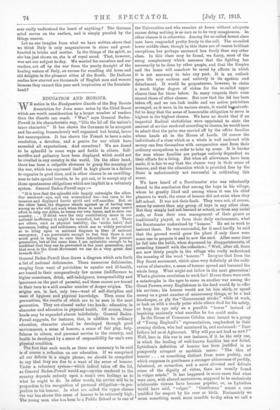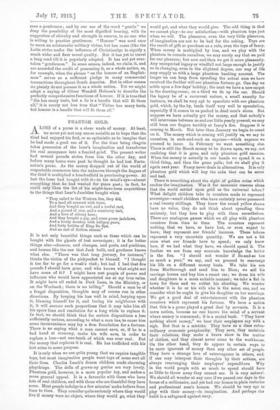EDUCATION AND HONOUR.
WE notice in the Headquarters Gazette of the Boy Scouts Association for June some notes by the Chief Scout which are worth consideration by a larger number of readers than the Gazette can reach. " War," says General Baden-
Powell in his characteristic way, "lifts the lid off the nation's inner character." It has shown the Germans to be arrogant and far-seeing, tremendously well organized but brutal, brave but unscrupulous. It has shown the French to have a calm resolution, a devotion, and a genius for war which have exceeded all expectations. And ourselves P We are found to be splendid in some ways and feeble in others. Self- sacrifice and gallantry have been displayed which could not be rivalled in any country in the world. On the other hand, there has been a culpable slowness to grasp the meaning of the war, which has expressed itself in high places in a failure to organize in good time, and in other classes in an unwilling- ness to take special trouble, to be put out, or to accept any of those spontaneous obligations which are implicit in a voluntary system. General Baden-Powell says
It is true that the splendid side largely outweighs the other. Our manhood—aye, and our womanhood too—has risen to the occasion and displayed heroic spirit and self-sacrifice. But, on the other hand, the disgrace stands against us of having men among as who will not work when there is need for every man's effort to help onr Allies, to lessen our own losses, and to save our country. . . . If drink were the only contributory cause in our national inefficiency it might be remedied, but it is not. There are others, such as physical inability, the 'strike habit,' dull ignorance, loafing and selfishness, which are so widely prevalent as to bring upon us national disgrace in time of national emergency. I am pessimistic enough to fool that there is not much good in trying to cure these infirmities in the present generation, but at the same time I am optimistic enough to be confident that they can be prevented in the next generation, and that even in the Scout Movement we can do a very great deal towards this."
General Baden-Powell then draws a diagram which sets forth a list of national deficiencies. These numerous deficiencies, ranging from want of patriotism to squalor and
are traced to their comparatively few causes (indifference to higher conscience, drink, self-indulgence, irresponsibility and ignorance on the part of parents), and these causes are traced in their turn to a still smaller number of deeper origins. The origins are, in fact, only two—want of self-discipline and want of hygiene and physical knowledge. Then come the preventives, the results of which are to be seen in the next generation. They are classed under two heads : education in character and education in physical health. Of course, these heads may be expanded almost indefinitely. General Baden- Powell suggests, for instance, that, in addition to ordinary education, character should be developed through good environment, a sense of honour, a sense of fair play, help- fulness to others, and personal service to the country, and health be developed by a sense of responsibility for one's own physical condition.
The fact that such words as these are necessary to be said is of course a reflection on our education. If we comprised
all our defects in a single phrase, we should be compelled to say that they are due to a want of the sense of honour. Under a voluntary system—which indeed takes off the lid, as General Baden-Powell would say—service rendered to the country depends entirely upon a man's own feelings as to what he ought to do. In other words, his service will be in proportion to his recognition of personal obligation—in pro. portion to his honour. In what are called the upper classes the war has shown this sense of honour to be extremely high. The young man who has been to a Public School or to one of
the Universities and who remains at home without adequate excuse doing nothing is so rare as to be very conspicuous. In other classes it is otherwise. Among the so-called lowest class men have responded pretty freely to the call. The so-called lower middle class, though in this there aro of course brilliant exceptions, has perhaps answered less freely than any other class. In this class may be found, we fancy, most of the smug complacency which assumes that the fighting has necessarily to be done by other people, and that the Empire and the home will somehow be saved by efforts in which it is not necessary to take any part. It is an outlook upon life very curious and unlovely in its egotism and detachment. It would be preposterous, however, to claim a much higher degree of virtue for the so-called upper classes than for those below. In many respects their vices exceed those of other classes. But now that the lid has been taken off, and we can look inside and see active patriotism arranged, as it were, in its various strata, it would bwintruth- ful to deny that the sense of honourable obligation to serve is highest in the highest classes. We have no doubt that if an impartial Radical statistician were appointed to state the amount of service rendered according to classes, he would have to admit that the palm was carried off by the effete families whose heads sit in the House of Lords. Of course the individuals of a class which as a whole is well endowed with money can free themselves with comparative ease from their ordinary occupations in order to take up arms. It is harder for men whose families are perhaps entirely dependent on their efforts for a living. But when all allowances have been made, it is fair to say that the classes vary in their sense of honour, and that the education which is provided free by the State is unfortunately not successful in cultivating this sense.
We have heard of a Scoutmaster who was reluctantly forced to the conclusion that among the boys in his village, whom he greatly liked and among whom it was his chief pleasure to work, the sense of honour did not exist when they left school. It was not their fault. They wore not, of course, worse by nature than any group of boys in any other class. But they simply had not learned at school, or from any social code, or from their own management of their games as traditionally played, or from their daily environment, what the Scoutmaster understood by " honour." He set to work to instruct them. He was successful, for it need hardly be said that the ground would grow the plant if only there were some one to prepare it and to sow the seed. After some time he fell into the habit, when depressed by disappointments, of consoling himself with the reflection: " Well, after all, there are now thirty people in the village who really understand the meaning of the word honour.' " Imagine that from the Boy Scout movement, which aims very definitely at the culti- vation of character, a sense of honour spread and leavened the whole lump. What might not follow in the next generation! What a glorious revolution to work for! If ever there were such a catastrophe in the ages to come as another war among the Great Powers, every Englishman in the land would fly to offer his services; his honour would not let him shirk, or spend money on a great number of unnecessary things, or be a bad timekeeper, or ply the "Government stroke" while at work, or look on with a steady pulse while others died for his safety, or keep his eye only on a possible " bonus" instead of inquiring anxiously what sacrifice he too could make.
In the house of Commons Cobden once turned to a group of "Young England's" representatives, resplendent in their evening clothes, who had sauntered in, and exclaimed: "Your fathers led us at Agincourt. Why will you not Iced us now ? " Well, here in this war is one instance, if it be the only one, in which the leading of well-known families has not failed. Lyttelton's definition of honour has been justified in no pompously arrogant or snobbish sense : " The idea of honour . . . as something distinct from more probity, and which supposes in gentlemen a stronger abhorrence of perfidy, falsehood, or cowardice, and a more elevated and delicate sense of the dignity of virtue, than are usually found in vulgar minds." It has happened in some cases that what were once, with absurd narrowness, supposed to be exclusively aristocratic virtues have become popular, or, as Lytteltou would have said, "vulgar." "Gentleman" meant a man qualified for respect by his race or birth. Fortunately we mean something much -more sensible to-day when we call a
an a gentleman ; and by our use of the word "gentle" we deny the possibility of the most dignified bearing, with its suggestion of chivalry and strength in reserve, to no one who is willing to practise gentleness. "Honour" was used once to mean an aristocratic military virtue, but has come (like the Latin shins under the influence of Christianity) to signify a much wider and finer moral quality. But it has yet to travel a long road till it is popularly adopted. It has not yet over- taken " gentleman." In some senses, indeed, we claim it, and are accorded the credit of possessing it, as a whole nation, as, for example, when the phrase " on the honour of an English- man" serves as a sufficient pledge in many commercial transactions throughout South America. But in other senses we plainly do not possess it as a whole nation. Yet we might adapt a saying of Oliver Wendell Holmes's to describe the perfectly comprehensive functions of honour. If it is true that "Sin has many tools, but a lie is a handle that will fit them all," it is surely not less true that " Virtue has many tools, but honour is a handle that will fit them all."



































 Previous page
Previous page